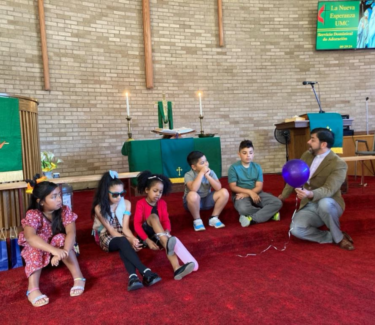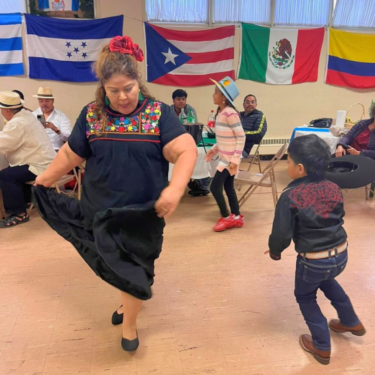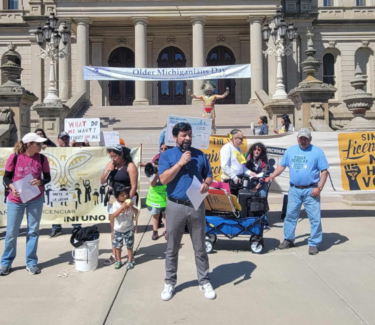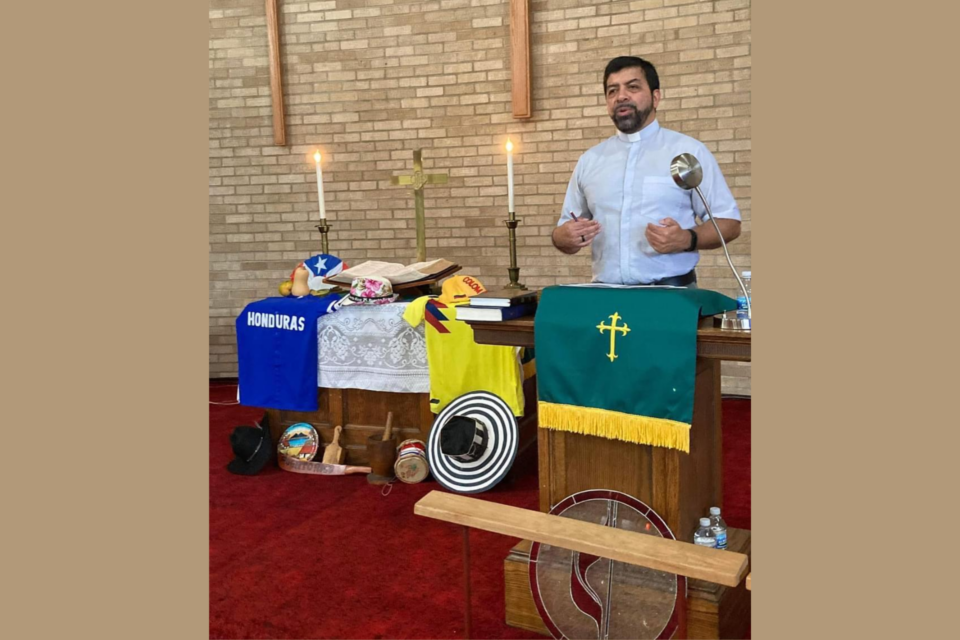For La Nueva Esperanza UMC in Grand Rapids, Hispanic Heritage Month welcomes us all to widely incorporate global worship practices and choose to love in inclusion and peace as Jesus loved.
FAITH GREEN TIMMONS
Michigan Conference Communications
Bountiful fruit in bright hues, festive music with Spanish lyrics, and handcrafted instruments for performing specific tunes are among the offerings worshipers at La Nueva Esperanza UMC in Grand Rapids bring to the altar on Communion Sunday. “Holy Supper [The Lord’s Supper] is a joyous time of singing for us,” said Rev. Ricardo Angarita, the congregation’s pastor. “We bring the instruments of our distinct heritage, share songs from our home countries, and incorporate several unique traditions into our shared time of worship. It is not uniform.”

La Nueva Esperanza UMC is a small yet highly diverse Hispanic congregation. With 51 professing members, this church could easily be counted among the most culturally inclusive churches in the Michigan Conference. The predominantly Spanish-speaking faith community represents over six nationalities. Pastor Angarita believes celebrating Hispanic Heritage Month, which runs through October 15, is an opportunity for all churches to broaden their understanding and appreciation for the contributions of Hispanic Americans and foster Christian unity.
The national observance began in 1968 as one week and is now a four-week celebration. Click to learn more. Pastor Angarita said that each fall offers an annual opportunity to highlight the many lessons on the significance of diversity. He believes that Christ-followers can more fully reflect God’s kingdom on earth when, as a church, we choose to love in inclusion and peace as Jesus loved.
“Holy Supper is a joyous time of sharing for us,” said the Columbian native. “We celebrate our differences. The Holy Spirit and the Holy Supper unite us, as does our openness and appreciation for sharing.” Sunday mornings at La Nueva Esperanza are a blend of several sacred traditions. The freedom to be creative provides a blended Methodist worship experience to which everyone contributes. Communion is a beautiful expression of cultural immersion. “The church is more than a place for worship and biblical teaching,” said Angarita. “It is a source of support, a resource center and community gathering, where our love for God is expressed through our love for and affirmation of one another.”
In English, “La Nueva Esperanza” means “New Hope.” Pastor Angarita stressed his sincere hope that Hispanic Heritage Month will open churches across Michigan to diverse expressions of worship. The West Michigan congregation is intentional about its mission “to follow the teachings of Jesus Christ, promote the values of the kingdom of God, and demonstrate a love that prevails through inclusion, equity, peace, and diversity for the transformation of the world.” They see Hispanic Heritage Month as an opportunity to widely incorporate global worship practices.

Pastor Angarita mentioned Communion Sunday’s rituals as one example. A common eucharistic practice in the United States is to adorn the sanctuary with white altar cloths, white table linens, and white paraments symbolizing purity. However, a common tradition for many Hispanic Christians is to present colorful thank offerings.
Pastor Angarita explained that, in his experience, this spiritual practice expresses a deep appreciation for God’s provision. Jesus is God’s first fruit, God’s one and only son, and the best gift that by grace has been offered to humanity. The theological intent is to reciprocate, offering our first fruits back to the God who gave so generously. It is a demonstration of heartfelt gratitude. Regarding both of these communion customs as equally sacred and holy, it is a significant way of honoring, respecting, and appreciating diversity as a gift in the body of Christ.
When United Methodists share the gifts of bread and wine, or juice, we often pray, “Pour out your Holy Spirit on us gathered here and on these gifts of bread and wine. Make them be for us the body and blood of Christ, that we may be for the world the body of Christ, redeemed by his blood.” The Great Thanksgiving for World Communion Sunday adds this invocation, “Renew our communion with your Church throughout the world, and strengthen it in every nation and among every people.” Worshipers at La Nueva Esperanza are encouraged to be intentional about living out that goal daily. They are also challenged to embody three defining aspects of doing church together: love, embrace, and serve Jesus as Lord, love and support one another, and provide a safe space for all, especially native Spanish speakers, with the understanding that learning English as a second language can be isolating as well as challenging.
Nearly six percent of Michiganders are Hispanic or Latinx. The latest census data shows that’s over half a million people. Angarita believes Hispanic Heritage Month presents an opportunity to address some hard-to-hear realities about our openness to diversity. “We have tried worshiping with non-Hispanics and received pushback. Some say we are too loud and expressive. Because they do not understand the meaning of the tradition, I have encountered some who were uncomfortable with the colorful presentation of fresh fruit as an offering — symbolizing the giving of one’s first fruits, especially during the eucharist. The spirit and meaning of the Holy Supper unite us, as does our openness and appreciation for sharing.”

The people of La Nueva Esperanza believe the church is more than a meeting place for prayer and praise. It is a communal space for sharing and working with other agencies that facilitate care, the preservation of human rights, workshops for reporting labor and personal abuses of any kind, training to develop better job skills, financial support, the conservation of the environment, immigration issues, and other vital concerns.
Pastor Angarita explained, “We are following the example of Christ, who showed us the way and gave us an example of the God of love, who created us and sent Jesus for the healing and salvation of human beings. We form alliances with organizations with similar principles and values to support, watch over, and help people in vulnerable situations.”
During the COVID-19 pandemic, regular worshipers dwindled to ten people. Some moved to find work, and others returned to their native countries during the shutdown. Today, up to 40 people regularly participate in weekly worship services. There are 30 committed members, plus their families.
Before his appointment to La Nueva Esperanza six years ago, Angarita worked on staff in the Port Huron District. In the fall of 2016, he moved to the United States with his daughter, now 28, and his son, 18. He is still working on strengthening his English. He said that communication barriers can isolate those still learning specific language skills. For them, the fellowship and support of a loving congregation are crucial for their daily encouragement and survival. “We are hard workers who bring our gifts and skills to this country to contribute and make a strong positive impact.”
A common misconception is that “Hispanic” refers only to a particular race or nationality. This ethnic group represents native Spanish speakers worldwide. While efforts to define ethnocentric designations are evolving and emerging, “Latino/Latina/Latinx” commonly refers to people of Latin American descent (Mexico, which is part of North America, Central America, and South America) and from islands in the Caribbean Sea. Each region and individual nation worships, dresses, eats, and celebrates differently, all of which are welcomed and encouraged at La Nueva Esperanza UMC.
Last Updated on October 14, 2024

